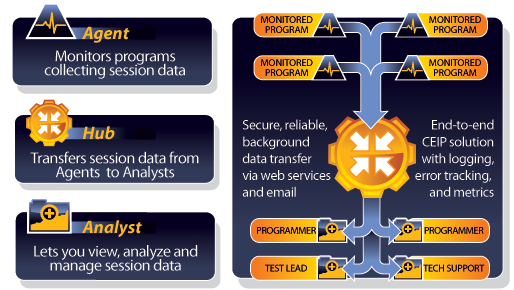Stay connected with your users via Gibraltar Hub
Following up on our announcement of Gibraltar Hub, I wanted to talk a bit more about what it does, how it works and our design goals in creating it.
We’ve always had an eye to making it as easy as possible to get diagnostic data from where your application is run back to the developers that can make good use of it. We built in a packager that could gather up all of the data and send it to you via email or write it to a single, highly compressed file. But we always knew we also wanted a way to transmit logs over basic web protocols.
What is Gibraltar Hub?
With the Gibraltar Hub we’ve created a service that listens for Gibraltar data sent to it via email or our RESTful web API. We’ve updated the Gibraltar Agent to be able to send data to the Hub just like it can send via email or write to a file. On the other side we’ve updated the Gibraltar Analyst to be able to retrieve all of the data sent to a Hub automatically in the background.
It sounds like a small thing - we put a web service between the Agent and the Analyst - but the effect on using Gibraltar is remarkable. First, it means that diagnostic data automatically flows to you without any extra work on your part. When you have hundreds or thousands of installed copies of your software that’s key. It makes it practical to gather and analyze all that data.
Second, multiple users can subscribe to the same Hub, meaning each gets a copy of the data. This keeps your whole team in the loop on what’s happening in the field. You can have your laptop and desktop both set up to get data so you can provide great customer support in the field and in the office.
Third, it still works with email. Based on the suggestions from our beta users we added the ability for the Hub to connect up to a mailbox and automatically pull in all of the Gibraltar data sent to it. This provides a few neat capabilities:
- End users can email in data collected from computers that can’t talk to the Hub directly.
- You can start off using email and easily migrate to the Hub without having to change the configuration of the Agents.
- You can use email as a fallback if for some reason a computer can’t access the web but can send email.
- You can selectively forward sets of log data into your whole team by just forwarding the email. This may fit well with your existing customer service system if it’s receiving the mail first.
It Just Works
Mobile User Support
Like many of our customers, we’re all over the place from day to day so it’s essential that our support infrastructure works wherever we are. We designed the Hub for this exact scenario because only the Hub has to be in a well known, accessible location: The Agents send to it, and the Analysts get data from wherever they are.
Large Sessions? Bad Connections? Firewalls?
We wanted to be absolutely sure that the Hub would Just Work. That meant even if you created really large log files or had a very dodgy network connection it still had to function without complaint. To support this, the Hub uses a chunked encoding method for uploading and downloading data to ensure that it’s efficient over bad or slow connections and won’t get halfway through sending a file only to discover that the web server won’t accept it because it’s too large.
We chose to use a RESTful API for the Hub with an eye to making it as compatible as possible with even the most strict firewall configurations. We work with customers that categorically block all SOAP web services and do other interesting content restrictions. Without being downright subversive, we wanted to make sure the Agent could always get data through.
On the Analyst side, it works in the background to stream the data from the Hub to your local repository so it’s available to you even if you lose your network connection.
Want to get started?
Upon release you can either purchase your own Private Hub to run on your own server or you can use the Gibraltar Hub Service that we host.
If you’re a registered user of Gibraltar you can try out the Gibraltar Hub Service right now. Just contact us to get your preview account set up. Depending on feedback we receive, we expect the general release to be in late December or early January.
If you hadn’t seen it in our previous post, here’s a short video tour (3 min) of Gibraltar Hub:
